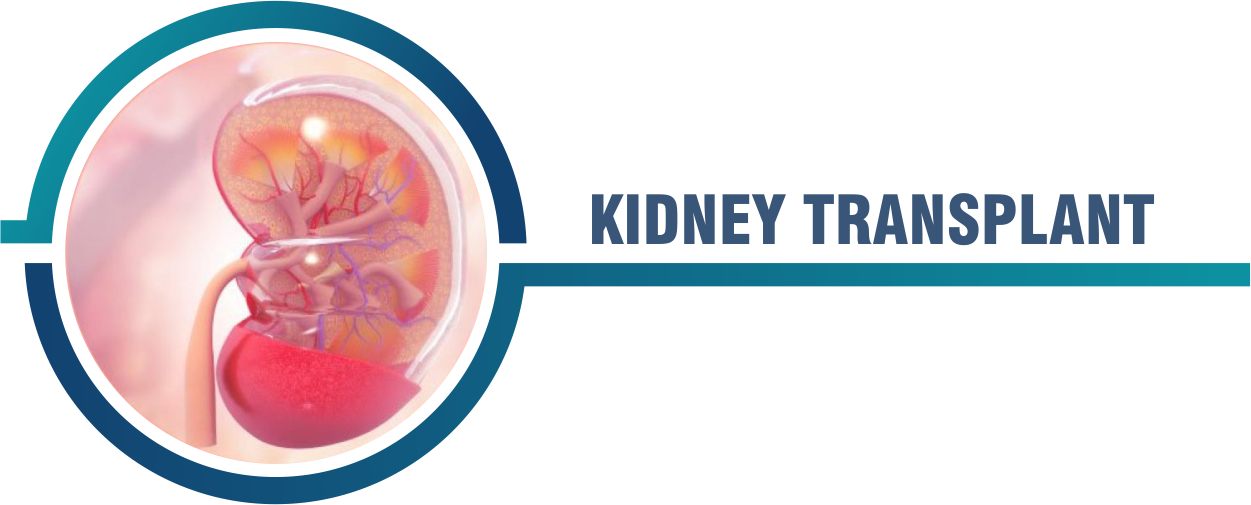
About Kidney Transplant
A surgical procedure called a kidney transplant is used to treat renal failure. A healthy kidney from a deceased person or a matching donor is used to replace a sick or failing kidney. The kidneys filter waste metabolites from the body and clean the blood by excreting waste through urine. As a result, the kidneys assist in controlling the body's electrolyte balance. Waste builds up in the body as a result of the kidneys' under working it when they are ill or injured, which can make a person very ill. There are many different situations that might lead to kidney injury. Dialysis is typically preferred with acute renal failure, while a kidney transplant is the sole treatment for chronic kidney failure.
If your kidney transplant is successful, you might live longer than you would have if you were still undergoing dialysis. Additionally, you might experience fewer health issues and a higher standard of living.
Symptoms
- Swelling of arms & legs.
- Shortness of Breath.
- Dehydration.
- Urinary Problems.
- Bleeding from any part of the Body.
- Nausea or Vomiting.
- Itching.
Risk Factor
There can be problems and difficulties, just like with any surgery. Potential dangers following a kidney transplant include:
- Temporary loss of kidney function - Your replacement kidney might not begin functioning right away, and you might need dialysis until it does.
- Organ Rejection- In the event that your body rejects the donor organ, you may need medicine to help your body accept a new kidney.
- Kidney Failure - After a number of years, your new kidney could stop working, necessitating a second transplant or a return to dialysis.
- Cancer - Taking immunosuppressive drugs after a transplant may make you more susceptible to illness.
- Diabetes - After a transplant, certain medications might lead to diabetes.
- Heart Attack or Stroke - If you have high blood pressure, high cholesterol, or diabetes, having a transplant puts you at a higher risk than a healthy individual who hasn't had one.
Investigations
Following are the tests done before the Kidney Transplant:
- Blood group (ABO)
- CBC
- Urine routine and culture
- Liver function Test
- Blood glucose
- Lipid Profile
- Renal function tests
- Screening tests for HbsAg/HCV/HIV/EBV/CMV IgG
- Tissue typing/HLA
- Lymphocyte cross-match
- Uroflowmetry post-void residue
- CT scan for kidney stone detection
- ECG, 2D echocardiography, and cardiac stress test
- X-ray Chest, ABG (arterial blood gases) & Lung function tests
- 24 hours urine protein
- GFR (Filtration rate) measurements
- Oral GTT (Glucose Tolerance Test)/HbA1c
- BT/PT/PTT tests
- Ultrasonography of abdomen
- CT angiography or selective renal angiography
- Psychological evaluation
| Procedure | India | Turkey | Dubai |
| (Price in USD) | (Price in USD) | (Price in USD) | |
| Kidney Transplant | 14500 | 20000 | - |
| Radical Nephrectomy | 5000 | 7000 | - |
Note : This is an approximate cost and may vary depending on various condition of the patient health after physical evaluation.
Treatment Options
Side Effects
Potential side effects of a kidney transplant may include:
- Narrowing of the artery leading to the kidney—also called renal artery stenosis
- Blood clots
- Infection
- Bleeding
- Weight gain
- High blood pressure
Benefits
- Dialysis is not necessary.
- Having greater energy.
- Achieving improved all-around health.
- Having fewer dietary constraints.
Success Rate
In the entire world, India has one of the highest success rates for kidney transplantation costs. Achievement rates are excellent overall.
When compared to transplants using deceased donors, live donor transplants have a substantially higher success rate.
While deceased donor transplants have an annual success rate of 85–90%, living donor transplants have a success rate of 90–95%.
Additionally, a blood-related donor performs better than a donor who is unrelated to the blood.
Effective kidney transplantation is largely dependent on cross-matching and HLA typing data.
